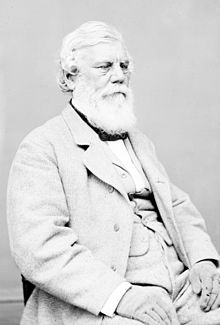William Aiken
William Aiken Jr. (born January 28, 1806 in Charleston , South Carolina , † September 16, 1887 in Flat Rock , North Carolina ) was an American politician ( Democratic Party ) and from 1844 to 1846 governor of the state of South Carolina.
Early years
William Aiken attended South Carolina College , now the University of South Carolina , until 1825 . Then he ran a rice plantation. His political career began in 1838 when he was elected to the South Carolina House of Representatives . He held this mandate until 1842. The following two years until 1844 he spent in the State Senate .
Governor of south carolina
In 1844, Aiken was elected the new governor of South Carolina. The focus of his two-year term of office was the economic upswing and the improvement of the infrastructure of his country. Above all, this included the construction and expansion of a railway network. At that time, large manufacturing companies sprang up all over South Carolina. During this time the Mexican-American War began , for which soldiers from South Carolina were also called in.
Due to a constitutional clause, Aiken could not be re-elected directly in 1846.
Further life
William Aiken remained politically active even after his governorship. Between 1851 and 1857 he represented his state in the US House of Representatives . In 1860 he was an opponent of secession , but had to submit to the majority. Nevertheless, at the end of the war he got into a conflict with the federal government because he refused to appear at the flag-raising in Fort Sumter on the occasion of the reconquest of the fort by the Union troops. He was arrested and taken to Washington, DC . There he was released by President Andrew Johnson , whom he knew from his Senate days. He was re-elected to Congress in 1867, but could not take office because the Republicans refused to give him his seat. He returned to South Carolina. There he devoted himself to his private affairs. He died in North Carolina in 1887 but was buried in Charleston.
His cousin D. Wyatt Aiken and his son Wyatt were also Congressmen for South Carolina.
Web links
- William Aiken in the Biographical Directory of the United States Congress (English)
- William Aiken in the National Governors Association (English)
- South Carolina Information Highway (English)
- William Aiken in the database of Find a Grave (English)
| personal data | |
|---|---|
| SURNAME | Aiken, William |
| ALTERNATIVE NAMES | Aiken, William Jr. |
| BRIEF DESCRIPTION | American politician |
| DATE OF BIRTH | January 28, 1806 |
| PLACE OF BIRTH | Charleston , South Carolina |
| DATE OF DEATH | September 16, 1887 |
| Place of death | Flat Rock , North Carolina |


